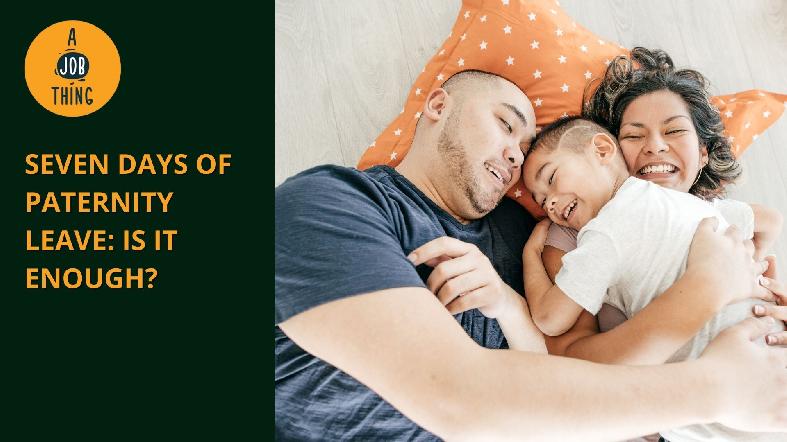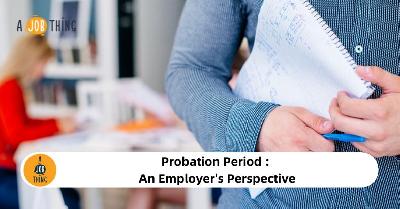
Is Seven Days Enough for Paternity Leave?
Create Job Description Using AI
Write appealing job descriptions for any job opening to attract the most qualifield and suitable candidates. FOR FREE.
try now
Mohd Izad Misri became the tiny infant's entire world for almost two months after his child was born ten weeks ahead of schedule in 2014, needing time in an incubator. Every day, the IT worker stroked and comforted the infant boy, delivering frozen breast milk to keep him alive until his mother was well enough to visit him.
"I saw him during my lunchtime. I (had to) take lunchtime for two hours. Normally it's one hour, but I spoke to my boss who gave me relief for two hours," he told Bernama through Zoom.
He took two weeks off to assist his wife, who was recovering alone at home, by cooking and cleaning for her until she could do it herself. He also took time off when his other children were born a few years ago.
Since Malaysia did not recognise paternity leave for workers in the private sector in Malaysia at the time, he took all of his vacation days from his annual leave. Only civil personnel were entitled to seven days of paternity leave. Fathers in the private sector, on the other hand, were forced to take a week or two off from work or take unpaid leave to be with their spouses.
Last month, the Dewan Rakyat adopted modifications to the Employment Act that guarantee working fathers at least seven days of paternity leave per baby for up to five children, regardless of the number of spouses. Paternity leave is only available to fathers who have worked at the company for at least 12 months.
Under International Labour Organization standards, the Dewan Rakyat also adopted an amendment to increase maternity leave from 60 to 98 days for private-sector employees and 90 days for civil personnel.
Gender equality
While he was pleased that Malaysia now provides seven days of paternity leave, Mohd Izad believed the number of days was insufficient.
"One week is not enough. During the second week (after delivery), the wife may not be strong enough to take good care of herself," he stated.
Experts agree that while the 98-day maternity leave is commendable, the seven-day paternity leave is insufficient to meet the demands of new parents. Nonetheless, they stated that it is progress, emphasising that it should only be the first step toward longer and more equitable benefits for fathers. The ideal situation would be similar to what industrialised countries like Canada and the European Union offer: months of shared parental leave for both parents.
Professor Dr Noraida Endut, director of the Centre for Research on Women and Gender at Universiti Sains Malaysia, said, "It's progress because it's from zero to seven days, but it's still quite unsatisfactory."
"Parental leave gives a better deal for parents, especially in terms of bonding with children, and it also encourages fathers to be more involved in childcare – it's actually a better outcome for the family."
Fathers who take paternity leave are more likely to return to work and improve their income
According to studies, women whose spouses take paternity leave are more likely to return to work and boost their income. Women's rights and labour organisations in Malaysia, such as the Women's Aid Organisation (WAO) and the Malaysian Trades Union Congress (MTUC), have been pushing for paternity leave for working fathers for years, claiming that it will help establish a more balanced workforce.
However, it wasn't until 2015 that the government took paternity leave seriously.
Noraida believes that part of the problem is that Malaysia is not fully prepared to provide equal leave for both parents because of the outdated mindset of gender roles and childcare. Men are the breadwinners, and women are expected to take full responsibility for childcare and child-rearing.
According to the Department of Statistics Malaysia, women's economic involvement in Malaysia is 55.3%, one of the lowest in Southeast Asia. Subsequent studies say following the birth of their children, a lot of these women withdrew from the labour force.
Critical for men to play a role from the start of their child's life
WAO deputy executive director Yu Ren Chung believes it is critical for men to have a part from the start of their child's life, not only to help the child but also to assist the wife in her recovery and return to work.
"Family care is the biggest issue and the reason why women get out of the workforce, unable to join even if they wanted to. We need to do something to change this mindset and really kind of break down these gender stereotypes that have led to situations where women have less economic freedom," he said.
He argued that the government should seek to provide fathers with more paternity leave because many of them wanted to be more active in their children's lives from the start.
Some firms, particularly small and medium-sized businesses, are unable or unwilling to extend longer paid paternity leave to their male employees. According to a WAO poll conducted in 2020, the spouses of 257 women with children were either denied paternity leave or were given less than a week off.
Women are still an essential component of labour
According to Randstad, a human resource consulting organisation, this will likely change if employers want to attract and keep excellent employees, including encouraging women to return to the workforce.
According to Fahad Naeem, head of operations at Randstad Malaysia, Malaysia has a talent deficit. More trained workers are needed in the IT and manufacturing industries to deal with automation and artificial intelligence.
He stated that women are an essential component of labour in all organisations and that barring them from the workforce due to child-rearing concerns will have an economic impact.
"If men and women are given the same benefits when they are giving birth or raising a child, if they can divide the responsibilities at some point, it can counter the problem, and you could have those women back in the workforce as well," he said.
How paternity leave helps families
Paternity leave is especially vital in this day and age, when extended family members are no longer available to assist with childcare.
"The kind of family we have now is very nuclear. We no longer can rely on extended family to take care of mothers recuperating after childbirth. We don't have a lot of access now to maids, for example," Noraida explained.
As a result, she believes men must have more paternity leave to assist their spouses in their recovery.
According to clinical psychologist Lee Kuan Shin, another benefit of keeping the spouse at home after childbirth is to protect his wife during the recuperation period.
"Some women go through postpartum blues. It does help to have someone around to share the load, to share the emotional overload," she stated.
The blues can sometimes turn into postpartum depression, which Lee defines as melancholy lasting longer than three weeks. Anxiety, as well as illogical and suicidal ideas, are some of the symptoms. Lee believes that having someone by the mother's side during this period would be beneficial, as it would provide guidance, assist her in adjusting to the baby, and seek support when necessary.
"It'll be nice to have another person just to share the load. It also demonstrates to the children that you can actually have both parents be in a partnership," Lee said.
Benefits of paternity leave
According to studies, women are less likely to develop depression within a year of giving birth if their husbands take paternity leave.
In addition, children are less prone to suffer mental health problems. Based on research, fathers' hormones adapt to care for their young children, indicating that the biological effect is not limited to women.
Research says men involved in child-rearing from the start are more likely to be involved for years to come. They also discovered that children who have involved parents are happy.
Poor communication, according to Lee, is the most common cause of mental health difficulties. When both parents were participating, they were more likely to be able to create an environment where children could interact openly with their parents.
"If a child is able to trust somebody, to tell his or her issue even at a young age, we can foresee the person growing up to have better communication, a better way of coping with the issues because they know how to reach out," she said.
Mohd Izad can speak to this, believing that the time spent bonding with his children when they have little produced a closeness that would be difficult to reproduce if those days were lost.
He said that if his children, the oldest of whom is 12 years old, had troubles, they would seek him out.
"I can tell you that I'm their favourite. Their mom can be a bit cranky," he said, laughing." he joked.
Source: BERNAMA





